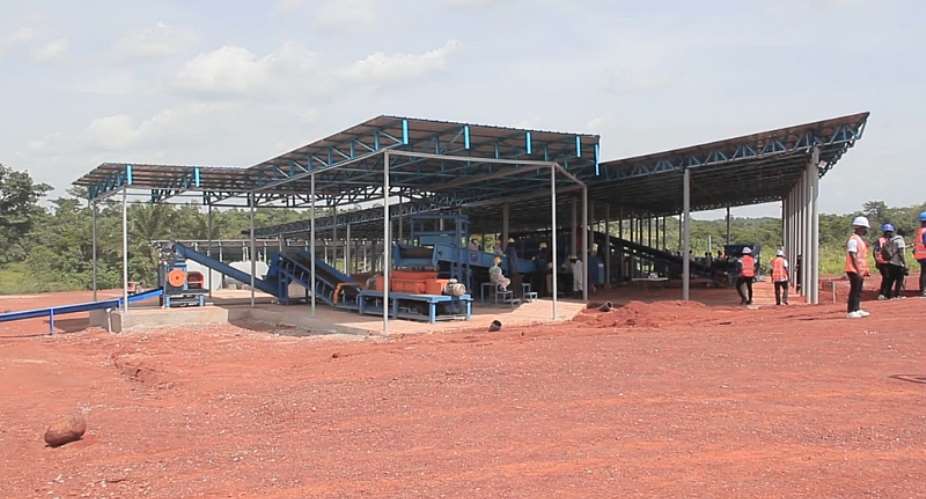A 400 kilowatt-hybrid waste to energy power plant to treat municipal solid waste in Ghana has been officially commissioned at Gyankobaa in Atwima Nwabiagya South Municipality in Ashanti.
The over-all aim of the project is to undertake research and development and capacity building, develop concepts for waste segregation and conversion of various fractions of municipal solid waste into energy by using hybrid biogas, pyrolysis and solar PV technologies.
Additionally, the project also seeks to create business models to successfully replicate and propagate this model in ten different regions in Ghana and will have different plants for RDF, a direct biogas steam reformation, methanation as well as CO2 gas capture.
About the Project
The German government through the Federal Ministry of Education and Research signed a 6.2 million euros contract with four institutions in Germany and one institution in Ghana comprising three academic institutions, one research and development institution and a medium-scale industry to design and construct a hybrid waste to energy power plant to treat municipal solid waste in Ghana.
The completion of the 48-month project will help to ensure the conversion of waste to energy in Kumasi and later extended to other parts of the country.
Expected results
The project seeks to improve sanitation, which is a major environmental challenge in the country, by converting the ever-increasing municipal solid waste into energy for productive uses and contribute to sustainable industrial development.
It will also train high-level local experts in waste treatment technologies in use in Germany to Ghana as well as build the capacity of local experts to design, construct and maintain a hybrid waste to energy facility.
Besides, the project would install a novel hybrid waste to energy treatment facility in Ghana that combines solar PV, biogas and pyrolysis technologies to treat to treat waste and generate power and further provide a blueprint for the propagation of ten additional waste to energy facilities in Ghana.
The project will be training 17 students pursuing Master’s degrees at the University of Energy and Natural Resources (UENR), KNUST and Kumasi Technical University and four PhD students.
Speaking at the ceremony, the Vice-Chancellor of the University of Energy and Natural Resources (UENR), Professor Elvis Asare-Bediako explained that the main focus of the project is to convert municipal solid waste, mainly plastics and organic waste, to electricity and compost.
“On this project UENR led the design of the sorting and size reduction equipment as well as their technical specifications, and also designed their layout in the factory.”
He also said UENR is providing capacity building by training students funded by the project, which include three MSc students on sustainable energy engineering with a focus on waste to energy research, adding that two more students will be admitted and trained.
“Also, one PhD student from UENR is being trained in Germany on waste to energy engineering, and UENR is co-supervising her work”, Prof Asare-Bediako said.
According to him, UENR is the only university accredited to train manpower and deliver services on energy and natural resources in West Africa, although other universities also run programmes related to energy.
Collaboration
“UENR is collaborating with 28 other universities, research institutions and municipalities in Europe and Africa on a waste to energy project funded by the European Commission. This is a 5-year project, which is aimed at converting agricultural waste to electricity and organic fertiliser.
“On the project; UENR is the scientific leader for all the research and engineering activities being executed by all universities on the project, the focal institution for all partners from West Africa and the lead for the design and installation of the different equipment that will be installed at the project site in Ghana
The Vice-Chancellor disclosed that UENR has received funding from Zoomlion Ghana Limited, waste management experts, to conduct research on converting waste into energy for use in various parts of the country.
To this end, UENR will conduct research in a bid to provide practical solutions to sustainably managing municipal solid waste; focusing on developing systems for managing solid wastes, especially in the Bono region.






 Election 2024: NPP done so much and deserves victory — Akufo-Addo
Election 2024: NPP done so much and deserves victory — Akufo-Addo
 AG has 'killed' Cecilia Dapaah matter; 'abrupt end' fits clearing-agent pattern—...
AG has 'killed' Cecilia Dapaah matter; 'abrupt end' fits clearing-agent pattern—...
 Former Weija-Gbawe MCE Patrick Kumor dies
Former Weija-Gbawe MCE Patrick Kumor dies
 Ghanaian Musician Itztiffany’s sister jailed in US
Ghanaian Musician Itztiffany’s sister jailed in US
 Cecilia Dapaah scandal: Withdraw letter to EOCO – Martin Kpebu to AG
Cecilia Dapaah scandal: Withdraw letter to EOCO – Martin Kpebu to AG
 IMF calls for tariff adjustment to enhance Ghana's energy sector cost recovery
IMF calls for tariff adjustment to enhance Ghana's energy sector cost recovery
 SML-GRA Contract: Insufficient evidence to prosecute government officials — Afen...
SML-GRA Contract: Insufficient evidence to prosecute government officials — Afen...
 Ketu North: NDC holds ‘Victory Health Walk’ ahead of election 2024
Ketu North: NDC holds ‘Victory Health Walk’ ahead of election 2024
 Tema Port truck drivers to embark on sit-down strike on May 6
Tema Port truck drivers to embark on sit-down strike on May 6
 Walewale NPP: Constituency Chairman endorsement of Tiah Mahama as PC prejudicial...
Walewale NPP: Constituency Chairman endorsement of Tiah Mahama as PC prejudicial...
